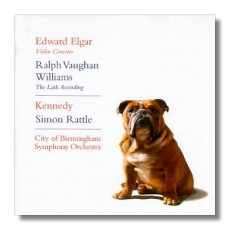
The Internet's Premier Classical Music Source
Related Links
- Latest Reviews
- More Reviews
-
By Composer
-
Collections
DVD & Blu-ray
Books
Concert Reviews
Articles/Interviews
Software
Audio
Search Amazon
Recommended Links
Site News
 CD Review
CD Review
Kennedy Plays Elgar & Vaughan Williams

- Edward Elgar: Violin Concerto Op. 61 (1910)
- Ralph Vaughan Williams: Romance "The Lark Ascending" (1914)
Kennedy, violin
City of Birmingham Symphony Orchestra/Simon Rattle
EMI 5 56413
This disc gets an award for, if nothing else, some of the oddest insert notes I have read. After the typical, and in this case quite interesting, notes about the music, there follows a commentary by the soloist about making the recording. Then follows a page of nonsense like, "The Bulldog. This aristocratic breed of dog, while loved universally, also represents some of the better, more noble aspects of the British psyche. Acclaimed worldwide, this type of dog has been befriended by various personalities ranging from Edward Elgar to down and out violinists who have nothing better to do than write stuff like this." While you might make some lame excuse for this by pointing out the fact that a bulldog graces the cover, the "stuff" goes on like this including a paragraph on "Deceased Fiddle Makers" etc. Whatever.
I have used this opportunity to review this disc to 'study' Elgar and his music. I confess that up to now I have never really appreciated Elgar. I felt his music reflected the 'stiff upper lip' kind of emotion you would expect of upper class British ilk. Actually, as I learned in Michael Steinberg's book, The Symphony, "Sir" Edgar was born poor and was self-taught. He was an intensely passionate man with strong feelings about his art. He was not an academic, like Stanford or Parry. His music, however, has seemed just beyond my musical reach.
As I listened to this recording of the violin concerto many thoughts crossed my mind. I noted that it reminded me of the kind of passion I hear in Beethoven's Violin Concerto. I wondered if he had heard Sibelius' Violin Concerto, which was premièred six years before. They are so different, and yet at the end of the second movement of the Elgar, I swear I expected to hear the third movement from Sibelius' work!!! I also re-listened to recordings of Elgar's Symphonies, with Sir John Barbirolli conducting. It was listening to "Sospiri", however, that opened my ears to the kind of emotional sound world that previously had eluded me. After that experience I was able to better appreciate the symphonies and the violin concerto.
Okay, now what of this recording? Well, I confess that the only other I have for reference is Kennedy's previous one (back when he had a first name). Kennedy's commentary probably offers the best explanation of the difference. "…I see my first recording…as being more text-book oriented and the one with Sir Simon as being more along the lines of the playing of Jacqueline du Pre or Artur Rubenstein, i.e. portraying the emotional moments emphatically but with still a regard for the structure, so that the text-book can be pushed aside." Moments are caressed just a bit longer, phrases are emphasized just a bit more in this recording. The result is more emotional. I have heard many recordings of this piece over the years, but this one seems to make the work 'make sense' for me.
To turn from the Elgar to the Vaughan Williams is kind of a shock. "The Lark Ascending" was premièred just ten years after Elgar's Concerto. My God, however, how completely different is Vaughan Williams' sound world. Though only 15 years separate the two composers in age, their music is vastly different. Both have what might be described as an "English Sound" but come at it from other angles. To my ears Vaughan Williams is more immediately emotional, less 'stiff upper lip' than Elgar. Now, I know that we are not comparing concertos in this case, but this is true of their symphonies as well. This recording is controversially slow, but I like the music so much that this just allows me to wallow in it even more.
You know how sometimes a piece of music gets 'wedded' to a non-musical event and the two become forever married? For example, almost any music from 'Fantasia' is joined by Disney and Stokowski's conceptions (and, yes, Stokowski did have some influence on the artwork). Just now I am going through the graduation of the 27th class in my career in public education. It is always a bit sad for me, about as nostalgic as I ever get. I know that I will always hear Elgar's Violin Concerto at the end of every other school year so long as I teach. I can thank Kennedy and Sir Simon for the experience and know I shall turn to their recording whenever I want to hear the piece again. It will be the paradigm for me.
Copyright © 1998, Robert Stumpf II


















